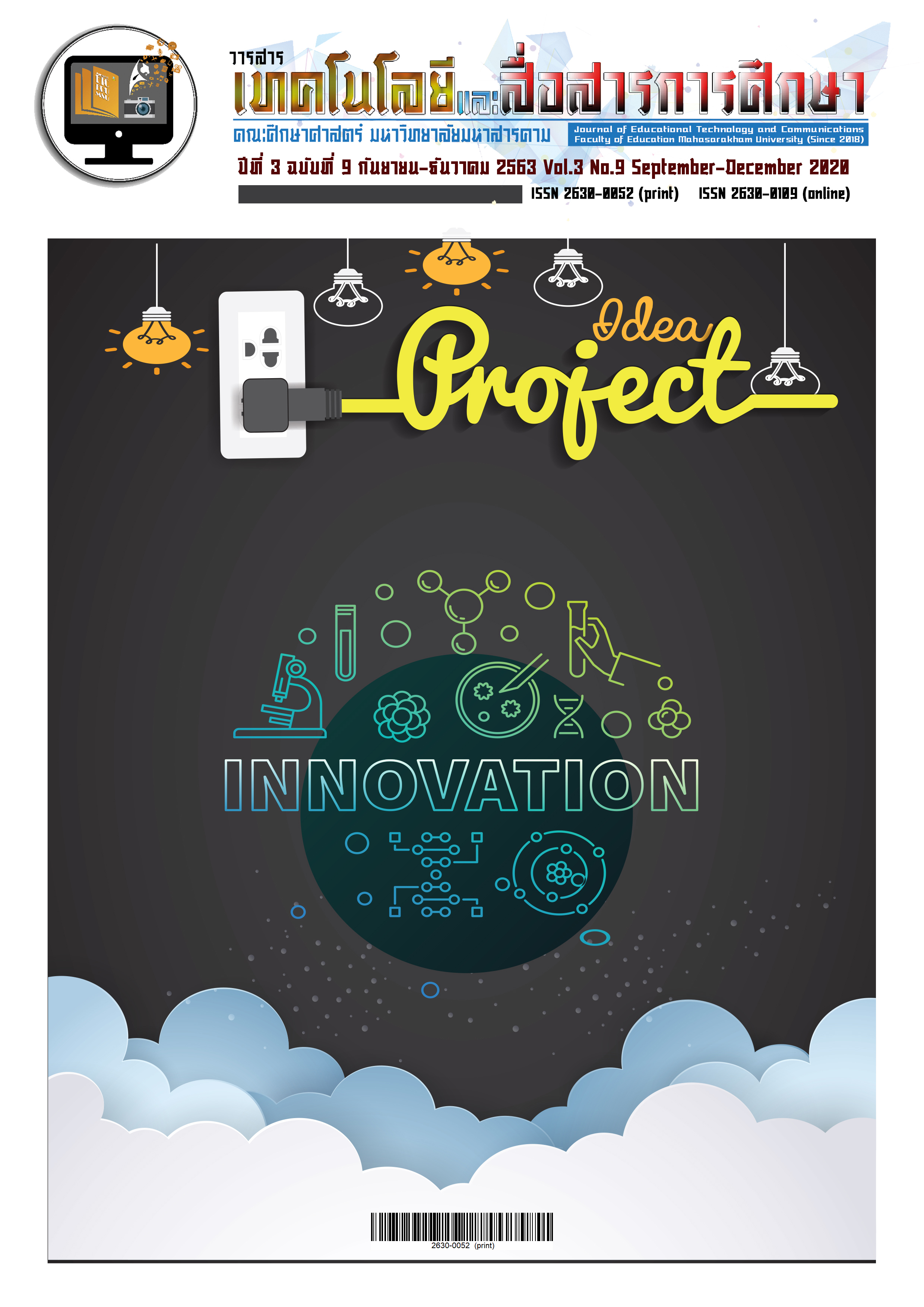Enhancement of Creativity through the use of Twitter for 9th student graders of Sa-nguan Ying School
Main Article Content
Abstract
This study was aimed to examine students’ creative thinking development before and after receiving the learning management to enhance the creativity through the use of Twitter among 9th grade students at Sa-Nguan Ying School. The participants consist of 48 students who were selected by using the purposive sampling method. All students have varied learning abilities of good, moderate and weak, but no differences in levels of creative thinking. The research instruments were: 1) lesson plans to enhance the creative thinking through the use of Twitter, 2) pre and posttests of creative thinking. All data was analyzed by using descriptive data analysis and t-test. The findings of this study found that the students’ creative thinking was higher after they participated in activities of lesson plans at p-value at 0.05. The mean score of student creative thinking was higher during the experimental period in which the key highlighted on hashtag of Twitter is a tool for learning management to enhance the creative thinking.
Downloads
Article Details
References
ตะวัน เทวอักษร. (2555). การศึกษาในศตวรรษที่ 21 แนวทางการสร้างนักเรียนพันธุ์ใหม่. School in focus, 4(11), 4-5.
ทากาฮาชิ มาโกโตะ. (2551). เทคนิคการแก้ไขปัญหาอย่างสร้างสรรค์. กรุงเทพฯ: สมาคมส่งเสริมเทคโนโลยี (ไทย-ญี่ปุ่น).
ทิศนา แขมมณี และคณะ. (2544). วิทยาการด้านการคิด. กรุงเทพฯ: บริษัท เดอะมาสเตอร์กรุ๊ป แมเนจเม้นท์ จำกัด.
บุญชม ศรีสะอาด. (2546). การวิจัยสำหรับครู. กรุงเทพฯ: สุวีริยาสาส์น.
ประจักษ์ ปฏิทัศน์. (2562). การคิดเชิงระบบและความคิดสร้างสรรค์. กรุงเทพฯ: จุฬาลงกรณ์มหาวิทยาลัย.
ประสาร มาลากุล ณ อยุธยา. (2545). ความคิดสร้างสรรค์ : พรสวรรค์ที่พัฒนาได้. พิมพ์ครั้งที่ 2. กรุงเทพฯ: คณะครุศาสตร์ จุฬาลงกรณ์มหาวิทยาลัย.
พัฐรัศมิ์ ว่องไชยกุล. (2562). Twitter ไทย โตเร็วที่สุดในอาเซียน รุกหนักจีบพันธมิตรสื่อเปิดช่องลงโฆษณา., [online] ได้จาก https://forbesthailand.com/news/it/twitter-ไทย-การเติบโต.html [สืบค้นเมื่อวันที่ 20 ตุลาคม 2562]
ราชกิจจานุเบกษา. (2561). ยุทธศาสตร์ชาติ (พ.ศ. 2561 - 2580). [online] ได้จาก http://www.ratchakitcha.soc.go .th/ DATA/PDF/2561/A/082/T_0001.PDF [สืบค้นเมื่อวันที่ 20 ตุลาคม 2562],
ศิริญญา ดวงคำจันทร์. (2558). การพัฒนากิจกรรมการเรียนรู้คณิตศาสตร์ตามแนวทฤษฎีคอนสตรัคติวิสต์โดยใช้เทคนิคระดมสมองที่ส่งเสริมความคิดสร้างสรรค์ เรื่อง อสมการเชิงเส้นตัวแปรเดียว ชั้นมัธยมศึกษาปีที่ 3. วารสารศึกษาศาสตร์ มหาวิทยาลัยขอนแก่น, 38(2): 63-70.
สมพร หลิมเจริญ. (2552). การพัฒนาหลักสูตรเพื่อส่งเสริมความคิดสร้างสรรค์ สำหรับนักเรียนช่วงชั้นที่ 2. ปริญญานิพนธ์ กศ.ด., มหาวิทยาลัยศรีนครินทรวิโรฒ, กรุงเทพฯ.
สำนักงานเลขาธิการสภาการศึกษา. (2560). แผนการศึกษาแห่งชาติ พ.ศ. 2560 – 2579. กรุงเทพฯ: พริกหวาน กราฟฟิค.
สำนักทดสอบทางการศึกษาแห่งชาติ. (2562). รายงานค่าสถิติพื้นฐานการสอบ GAT/PAT ประจำปี 2562.[online] ได้จาก https://www.niets.or.th/uploads/editor/files/GAT-PAT/รายงานค่าสถิติพื้นฐานการสอบ%20GATPAT%20ประจำปีการศึกษา%202562.pdf [ สืบค้นเมื่อวันที่ 20 ตุลาคม 2562],
สิริลักษณ์ ตาณพันธุ์. (2558). ผลของการจัดกิจกรรมการเรียนรู้สังคมศึกษาโดยใช้กระบวนการแก้ปัญหาเชิงสร้างสรรค์ที่มีต่อความสามารถในการคิดสร้างสรรค์และการคิดอย่างมีวิจารณญาณของนักเรียนระดับชั้นมัธยมศึกษาปีที่ 3. ปริญญานิพนธ์ ค.ม., จุฬาลงกรณ์มหาวิทยาลัย, กรุงเทพฯ.
สุวิทย์ มูลคำ. (2547). กลยุทธ์...การสอนคิดเชิงสร้างสรรค์. กรุงเทพฯ: ภาพพิมพ์.
อารี พันธ์มณี. (2545). ฝึกให้คิดเป็น คิดให้สร้างสรรค์. พิมพ์ครั้งที่ 2. กรุงเทพฯ: ใยไหม.
GROSSECK, G & HOLOTESCU, C. (2008). The 4th Internatioal Sciencefic Conference eLSE : Can We Use Twitter For Educational Activities?. Bucharest: Scribd Ince.
Luo, T., Shah, S.J., & Crompton, H. (2018). “Using Twitter to support reflective learning in an asynchronous online course.” Australasian Journal of Education Technology, 35 (3): 31-44.
Tur, T & Marin, V.I. (2015). “Enhancing learning with the social media: student teachers’ perceptions on Twitter in a debate activity.” New Approaches in Educational Research, 4 (1): 46-53.
Twitter in collaboration with UNESCO. (n.d.). Teaching and Learning with Twitter. [online] available from https://about.twitter.com/content/dam/about-twitter/company/twitter-for-good/en/teaching-learning-with-twitter-unesco.pdf [Retrieved October 20, 2019, ]


